#writing tips fantasy
Text
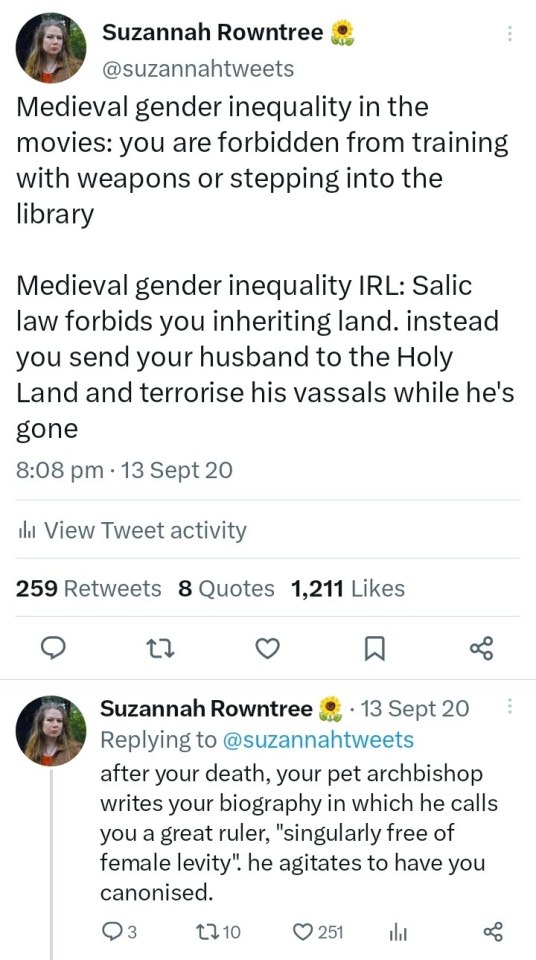
all RIGHT:
Why You're Writing Medieval (and Medieval-Coded) Women Wrong: A RANT
(Or, For the Love of God, People, Stop Pretending Victorian Style Gender Roles Applied to All of History)
This is a problem I see alllll over the place - I'll be reading a medieval-coded book and the women will be told they aren't allowed to fight or learn or work, that they are only supposed to get married, keep house and have babies, &c &c.
If I point this out ppl will be like "yes but there was misogyny back then! women were treated terribly!" and OK. Stop right there.
By & large, what we as a culture think of as misogyny & patriarchy is the expression prevalent in Victorian times - not medieval. (And NO, this is not me blaming Victorians for their theme park version of "medieval history". This is me blaming 21st century people for being ignorant & refusing to do their homework).
Yes, there was misogyny in medieval times, but 1) in many ways it was actually markedly less severe than Victorian misogyny, tyvm - and 2) it was of a quite different type. (Disclaimer: I am speaking specifically of Frankish, Western European medieval women rather than those in other parts of the world. This applies to a lesser extent in Byzantium and I am still learning about women in the medieval Islamic world.)
So, here are the 2 vital things to remember about women when writing medieval or medieval-coded societies
FIRST. Where in Victorian times the primary axes of prejudice were gender and race - so that a male labourer had more rights than a female of the higher classes, and a middle class white man would be treated with more respect than an African or Indian dignitary - In medieval times, the primary axis of prejudice was, overwhelmingly, class. Thus, Frankish crusader knights arguably felt more solidarity with their Muslim opponents of knightly status, than they did their own peasants. Faith and age were also medieval axes of prejudice - children and young people were exploited ruthlessly, sent into war or marriage at 15 (boys) or 12 (girls). Gender was less important.
What this meant was that a medieval woman could expect - indeed demand - to be treated more or less the same way the men of her class were. Where no ancient legal obstacle existed, such as Salic law, a king's daughter could and did expect to rule, even after marriage.
Women of the knightly class could & did arm & fight - something that required a MASSIVE outlay of money, which was obviously at their discretion & disposal. See: Sichelgaita, Isabel de Conches, the unnamed women fighting in armour as knights during the Third Crusade, as recorded by Muslim chroniclers.
Tolkien's Eowyn is a great example of this medieval attitude to class trumping race: complaining that she's being told not to fight, she stresses her class: "I am of the house of Eorl & not a serving woman". She claims her rights, not as a woman, but as a member of the warrior class and the ruling family. Similarly in Renaissance Venice a doge protested the practice which saw 80% of noble women locked into convents for life: if these had been men they would have been "born to command & govern the world". Their class ought to have exempted them from discrimination on the basis of sex.
So, tip #1 for writing medieval women: remember that their class always outweighed their gender. They might be subordinate to the men within their own class, but not to those below.
SECOND. Whereas Victorians saw women's highest calling as marriage & children - the "angel in the house" ennobling & improving their men on a spiritual but rarely practical level - Medievals by contrast prized virginity/celibacy above marriage, seeing it as a way for women to transcend their sex. Often as nuns, saints, mystics; sometimes as warriors, queens, & ladies; always as businesswomen & merchants, women could & did forge their own paths in life
When Elizabeth I claimed to have "the heart & stomach of a king" & adopted the persona of the virgin queen, this was the norm she appealed to. Women could do things; they just had to prove they were Not Like Other Girls. By Elizabeth's time things were already changing: it was the Reformation that switched the ideal to marriage, & the Enlightenment that divorced femininity from reason, aggression & public life.
For more on this topic, read Katherine Hager's article "Endowed With Manly Courage: Medieval Perceptions of Women in Combat" on women who transcended gender to occupy a liminal space as warrior/virgin/saint.
So, tip #2: remember that for medieval women, wife and mother wasn't the ideal, virgin saint was the ideal. By proving yourself "not like other girls" you could gain significant autonomy & freedom.
Finally a bonus tip: if writing about medieval women, be sure to read writing on women's issues from the time so as to understand the terms in which these women spoke about & defended their ambitions. Start with Christine de Pisan.
I learned all this doing the reading for WATCHERS OF OUTREMER, my series of historical fantasy novels set in the medieval crusader states, which were dominated by strong medieval women! Book 5, THE HOUSE OF MOURNING (forthcoming 2023) will focus, to a greater extent than any other novel I've ever yet read or written, on the experience of women during the crusades - as warriors, captives, and political leaders. I can't wait to share it with you all!
#watchers of outremer#medieval history#the lady of kingdoms#the house of mourning#writing#writing fantasy#female characters#medieval women#eowyn#the lord of the rings#lotr#history#historical fiction#fantasy#writing tip#writing advice
29K notes
·
View notes
Text
Some Quick Character Tips
Here are a handful of quick tips to help you write believable characters!
1. A character’s arc doesn’t need to grow linearly. Your protagonist doesn’t have to go from being weak to strong, shy to confident, or novice to professional in one straight line. It’s more realistic if they mess up their progress on the way and even decline a bit before reaching their goal.
2. Their past affects their present. Make their backstory matter by having their past events shape them into who they are. Growing up with strict parents might lead to a sneaky character, and a bad car accident might leave them fearful of driving.
3. Give reoccurring side characters something that makes them easily recognizable. This could be a scar, a unique hairstyle, an accent, or a location they’re always found at, etc.
4. Make sure their dialogue matches their personality. To make your characters more believable in conversation, give them speech patterns. Does the shy character mumble too low for anyone to ever hear, does the nervous one pace around and make everyone else on edge?
5. Make your characters unpredictable. Real people do unexpected things all the time, and this can make life more exciting. The strict, straight-A student who decides to drink at a party. The pristine princess who likes to visit the muddy farm animals. When character’s decide to do things spontaneously or in the heat of the moment, it can create amazing twists and turns.
6. Give even your minor character's a motive. This isn’t to say that all your characters need deep, intricate motives. However, every character should need or want something, and their actions should reflect that. What’s the motive behind a side character who follows your protagonist on their adventure? Perhaps they’ve always had dreams of leaving their small village or they want to protect your protagonist because of secret feelings.
Instagram: coffeebeanwriting
#writing tips and tricks#writing tips#writing advice#creative writing#writeblr#writing blog#how to write#writing help#writing fiction#writing prompts#fantasy writing#authortips#authoradvice#writingtips#writingmemes#writers blog#writingblog#authorsblog#howtowrite#writingtipsandtricks#writerscommunity#writers community#writinghelp#writingprompts#writertips#howtowriteascene#writingfiction#fictionwriting#fantasywriting#writing memes
23K notes
·
View notes
Text
World Building Checklist
Have you ever started writing a story and realized your world has a bunch of unexplained shit and you have to fill in the gaps as you go? Me too, buddy. Me too. Here’s a checklist so that you can fully flesh out your world to the max. (I’m dying)
How does Time work? (Minutes, hours, days, the daylight cycle, years, ect.)
Species (if Fantasy. Will probably make another post on this.)
Countries, Nations, Tribes, ect. (nationalities/ races. Will probably make another post on this.)
The geography of the world (draw a map. Doesnt have to be good. Just for a general idea.)
Rivalries between races (includes prejudice, racism, ect.)
Religions
Technology
The Magic system. (Will probably make a whole other post on this.)
animals, plants, ect.
The sky: Sun, Moon(s), Stars, Constellation, Are there rings? (If the planet has rings)
Educations system
Government system
Politics
Methods of transport (Vehicles)
Medicine
Can’t really think of anything else. If you have more to add then reblog and add to the list! :) bye bee
#writing advice#how to write#creative writing#writers on tumblr#writing#writeblr#world#world building#fantasy worldbuilding#fantasy writing#fantasy tips#Fantasy world building tips#Writing tips#HEAVENLYRAIN’S WRITING TIPS
2K notes
·
View notes
Text
a list of 100+ buildings to put in your fantasy town
academy
adventurer's guild
alchemist
apiary
apothecary
aquarium
armory
art gallery
bakery
bank
barber
barracks
bathhouse
blacksmith
boathouse
book store
bookbinder
botanical garden
brothel
butcher
carpenter
cartographer
casino
castle
cobbler
coffee shop
council chamber
court house
crypt for the noble family
dentist
distillery
docks
dovecot
dyer
embassy
farmer's market
fighting pit
fishmonger
fortune teller
gallows
gatehouse
general store
graveyard
greenhouses
guard post
guildhall
gymnasium
haberdashery
haunted house
hedge maze
herbalist
hospice
hospital
house for sale
inn
jail
jeweller
leatherworker
library
locksmith
mail courier
manor house
market
mayor's house
monastery
morgue
museum
music shop
observatory
orchard
orphanage
outhouse
paper maker
pawn shop
pet shop
potion shop
potter
printmaker
quest board
residence
restricted zone
sawmill
school
scribe
sewer entrance
sheriff's office
shrine
silversmith
spa
speakeasy
spice merchant
sports stadium
stables
street market
tailor
tannery
tavern
tax collector
tea house
temple
textile shop
theatre
thieves guild
thrift store
tinker's workshop
town crier post
town square
townhall
toy store
trinket shop
warehouse
watchtower
water mill
weaver
well
wind mill
wishing well
wizard tower
#worldbuilding#setting prompts#writer resources#writing inspiration#writing prompts#scene settings#writing reference#writing ideas#prompt list#creative writing#writing community#writer prompts#writing tips#world#fantasy world#fantasy worldbuilding#high fantasy#world building#epic fantasy#writing fantasy
2K notes
·
View notes
Text
Just in case anyone was confused or concerned.
Drafting is a skill. And it's a skill you can learn. If you ever look at your first draft and go 'actually this is good' do not immediately go 'no it's can't be good it's a first draft'. If you've been writing for a while (like years) writing a draft that is perfectly serviceable and only needs some editing without a ton of cutting is like... fine.
I spend a lot of my time 'writing' and 'rewriting' drafts 6-10 times in my head and when they finally come out as my 'first draft' (or a second in some cases) it's already been through 2-8 revisions. The work has been done and the words I'm writing are the culmination of those revisions. I just didn't write it down.
Not all revisions have to take place in meat space or as text on a screen. Revisions happen as you play out scenarios over and over again in day dreams or bed time stories. Your first draft is not something that Must be conquered and tamed into something presentable. Sometimes you nail it because you've spent all the revision time already.
This is not something that comes to everyone. But it is something you can get good at. You do not have to agonize over a 5th rewrite if the first time you've put words to paper is already the 6th revision that's gotten better every time. There's a lotta 'you gotta suffer to make a book good' in writeblr I just don't agree with. You can just nail it the "First Time". Not every time. But you can.
1K notes
·
View notes
Text
What No One Tells You About Writing Fantasy
Every author has their preferred genres. I love fantasy and sci-fi, but began with historical fiction. I hated all the research that historical fiction demands and thought, if I build my own world, no research required.
Boy, was I wrong.
So to anyone dipping their toe into fantasy/sci-fi, here’s seven things I wish I knew about the genres before I committed to writing for them.
1. You still have to research. Everything.
If you want any of your fantasy battle sequences, or your space ships, or your droids and robots, or your fictional government and fictional politics to read at all believable.
In sci-fi, you research astronomy, robotics, politics, political science, history, engineering, anthropology. In fantasy, you have to research historical battle tactics, geography, real-world mythology, folklore, and fairytales, and much of it overlaps with science fiction.
I say you *have to* assuming you want your work to be original and unique and stand out from the crowd. Fanfic writers put in the research for a 30k word smut fic, you can and will have to research for your original work.
2. Naming everything gets exhausting
I hate coming up with new names, especially when I write worlds and places divorced from Earthly customs and can’t rely on Earthly naming conventions. You have to name all your characters, all your towns, villages, cities, realms, kingdoms, planets, galaxies, star systems.
You have to name your rebel faction, your imperial government, significant battles. Your spaceships, your fantasy companies and organizations, your magic system, made-up MacGuffins, androids, computer programs. The list goes on and on and on.
And you have to do it all without it sounding and reading ridiculous and unpronounceable, or racist. Your fantasy realms have to have believable naming patterns. It. Gets. Exhausting.
3. It will never read like you’re watching a movie
Do you know how fast movies can cut between scenes? Movies can balance five plotlines at once all converging with rapid edits, without losing their audience. Sometimes single lines of dialogue, or single wordless shots are all a scene gets before it cuts. If you try to replicate that by head-hopping around, you will make a mess.
It’s perfectly fine to write like you’re watching a movie, but you can’t rely on visual tricks to get your point across when all you have is text on a page – like slow mo, lens flares, epically lit cinematic shots, or the aforementioned rapid edits.
It doesn’t have to, nor should it, look like a movie. Books existed long before film, so don’t let yourself get caught up in how ~cinematic~ it may or may not look.
4. Your space opera will be compared to Star Wars and Star Trek
And your fairy epic will be compared to Tinkerbell, your vampires to Twilight, your zombies to The Walking Dead, Shaun of the Dead, World War Z. Your wizards and witches and any whisper of a fantasy school for fantasy children will be compared to Harry Potter. Your high fantasy adventure will be compared to Lord of the Rings.
You can’t avoid it, but you can avoid doing it to yourself. When people ask about your book, let them say “oh, you mean like Star Wars” to which you then can say, kind of, except XYZ happens in my book. These IPs will never fade from the public consciousness, not while you exist to read this post, at least, but Harry Potter isn’t the only urban fantasy out there. Lord of the Rings isn’t the only high fantasy. Star Wars isn’t the only space opera.
Yours will be on the shelves right next to them, soon enough, and who knows? You might dethrone them.
5. Your world-building is an iceberg, and your book is the tip
I don’t pay for any of those programs that help you organize your book and mythos. I write exclusively on Apple Notes, MS Word, and Google Suite (and all are free to me). I have folders on Apple Notes with more words inside them than the books they’re written for.
If you try to cram an entire college textbook’s worth of content into your novel, you will have left zero room for actual story. The same goes for all the research you did, all the hours slaving away for just a few details and strings of dialogue.
There’s a balance, no matter how dense your story is. If you really want to include all those extra details, slap some appendices at the end. Commission some maps.
6. The gatekeeping for fantasy and sci-fi is still very real
Pen names and pseudonyms exist for a reason. A female author writing fantasy that isn’t just a backdrop for romance? You have a harder battle ahead of you than your male counterparts, at least in the US. And even then, your female protagonist will be scrutinized and torn apart.
She’ll either be too girly or not girly enough, too sexy, or not sexy enough. She’ll be called a Mary Sue, a radical feminist mouthpiece, some woke propaganda. Every action she takes will be criticized as unrealistic and if she has fans who are girls, they will be mocked, too.
If you have queer characters, characters of color, they won’t be good enough, they won’t please everyone, and someone will still call you a bigot. A lot of someones will still call you a bigot.
Do your due diligence and hire your army of sensitivity readers and listen to them, but you cannot please everyone, so might as well write to please yourself. You’re the one who will have to read it a thousand times until it’s published.
7. Your “original” idea has been done before, and that’s okay
Stories have been told since before language evolved. The sum of the parts of your novel may be original, but even then, it’s colored by the media you’ve consumed. And that’s okay!
How many Cinderella stories are there? How many high fantasies? How many books about werewolves and witches and vampires? Gods and goddesses and celestial beings? Fairies and dragons and trolls? Aliens, robots, alien robots? Romeo and Juliette? Superheroes and mutants?
Zombies may be the avenue through which you tell your story, but it’s not *just* about zombies, is it? It’s about the characters who battle them, the endurance of the human spirit, or the end of an era, the death of a nation. So don’t get discouraged, everyone before you and everyone after will have written someone on the backs of what came before and it still feels new.
1K notes
·
View notes
Text
Dear people who aren't physically disabled who plan to write fantasy settings:

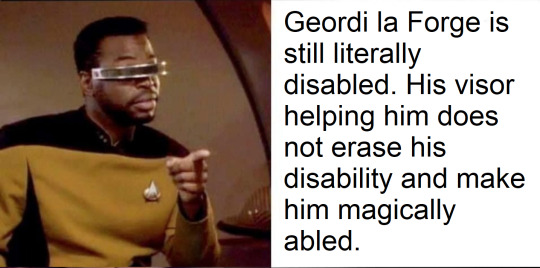
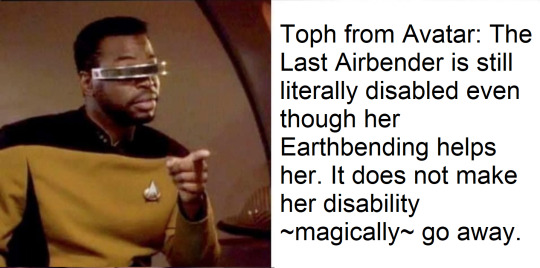


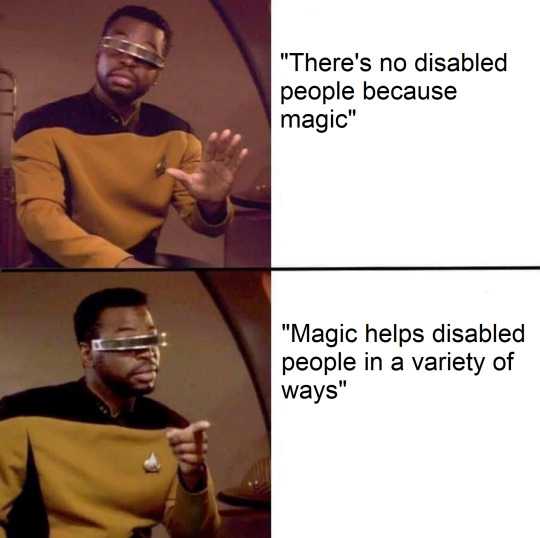
[ID: Several images taken from the Geordi La Forge yes and no meme format, with Geordi holding out a hand disapprovingly for the no section, then pointing in approval for the yes section.
The first image is the meme:
No: "Saying the existance of magic in your setting means there are no disabled people (this literally just means disabled people are killed. AKA eugenics)"
Yes: "Having disabled people who use magical mobility aids and other assistive devices. Realizing that someone is still disabled even if their prosthetic arm is made of magic instead of plastic."
This is followed by four more panels of yes section:
"Geordi la Forge is still literally disabled. His visor helping him does not erase his disability and make him magically abled."
"Toph from Avatar: The Last Airbender is still literally disabled even though her Earthbending helps her. It does not make her disability ~magically~ go away."
"Having your disability be accomodated does not mean the disability goes away. Having a prosthetic hand, even one that's made of magic, does not mean you're not disabled."
"Magical mobility aids do not mean disabled people don't exist. It just means they use magical mobility aids instead of plastic or metal ones. A limb made of magic is still a prosthetic even if it's made of the soul of the universe instead of plastic and metal."
Then another no panel: "'There's no disabled people beacuse magic'".
Then one last yes panel: "'Magic helps disabled people in a variety of ways'".
End ID.]
This also applies to science fiction; just because Luke Skywalker's prosthetic hand is super advanced doesn't mean it's no longer a prosthetic, or that he's not disabled. Same with Darth Vader - just because he has a suit that lets him breathe and walk around doesn't mean he's not disabled. (And Star Wars' propensity for making the villains visibly disabled while the heroes disabilities get covered up by super advanced prosthetics is a topic that deserves its own post, especially with how ableist some of the authors of the books are. Troy Denning is especially ableist)
Edit:
Because people keep being fucking obnoxious and ableist in the tags, yes,,, motherfuckers, if you refuse to have disabled people in your setting, that does make you fucking ableist. If you say that the magic is used to cure all disabled people and that's why they don't exist, that's fucking eugenics.
You cannot ""cure"", more like remove all disabilities without fucking eugenics. Magically automatically destroying disabled fetuses (a very fucking popular trope!) is eugenics.
The only way to fucking "cure" autism is to fucking kill all autistic people, also known as eugenics!
What about people with PTSD? Do you just fucking brainwash them so they aren't traumatized anymore?
Do you force all Deaf people to be able to hear? Do you force all blind people to be able to see? Do you force all anosmics to be able to smell?
Do you magically force everyone with a speech impediment to speak to your standards?
Do you force everyone born with bodily or facial differences to live up to your fucking standard of beauty?
You cannot fucking say "disablities don't exist in this universe because magic cures everything" without inherently saying that eugenics exists in your fucking universe.
Not all fucking disabilities need a cure. If you ""cured"" my autism I'd just be fucking dead. You'd literally just be changing me into what you think is fucking acceptable.
Stop fucking arguing in defence of ableists on my fucking post so you can pretend that eugenics has never been written about in magical settings when it is extremely fucking prevalent.
And while we're fucking at it, let your gods damned characters become disabled over the course of their story, and call them disabled within the fucking story. I don't care if they're a robot. I don't care if they have magic. Not all fucking damage can be fixed. Curses exist. Hardware can go out of fucking date and no longer be manufactured anywhere.
Let your characters become disabled and do not magically fucking cure them back to brand new every single time they get hurt. The only thing you accomplish by doing that is destroying any chance of ever having stakes.
No, "magical healing leaves scars on the mind from the memory of the injuries though!!!!" is not fucking good enough. Let your characters have scars. Let them become disabled. Stop being fucking ableist cowards.
Edit number fucking 2:
No, motherfuckers, you do not get to comment "if the disability was caused by magic it's not ableist to cure it with magic". You are the ableist this post is about. Shut the absolute fuck up, stop treating being disabled as the worst possible outcome, and just admit you're a fucking ableist. If you don't want your characters to become disabled, then don't fucking make them disabled.

[ID: The Garfield "you are not immune to propaganda" meme, now edited to read:
"If your first thought upon reading this post is, 'Oh, but it's okay to magically cure disabilities caused by magic!' Congrats…you are the exact sort of ableist jackass this post is about."
End ID.]
Edit number fucking 3:
Autistic people exist! People who are born with disabilities exist! You cannot create a setting where disabled people do not exist because we're all "cured" or "fixed" and not inherently say that you are killing disabled people as soon as they're born, or fucking aborting us as soon as you figure out we'd be born disabled! That's fucking eugenics!
There is no way to "cure" autism without eugenics! There is no way to "cure" people with body differences without eugenics! There is no way to make disabled people nonexistant in your setting without eugenics! Thinking you can and should "cure" and "fix" all disabilities IS EUGENICS!
Also:
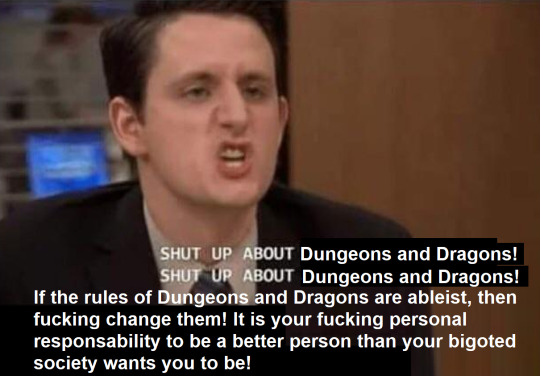
[ID: A character shouting at the camera, now edited to read:
"Shut up about Dungeons and Dragons! Shut up about Dungeons and Dragons! If the rules of Dungeons and Dragons are ableist, then fucking change them! It is your fucking personal responsability to be a better person than your bigoted society wants you to be!".
End ID.]
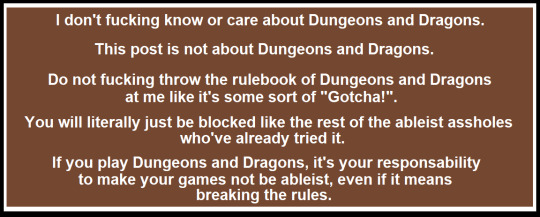
[ID: White text on a dark brown background with white and black borders around the edges, that reads:
"I don't fucking know or care about Dungeons and Dragons.
This post is not about Dungeons and Dragons.
Do not fucking throw the rulebook of Dungeons and Dragons at me like it's some sort of 'Gotcha!'.
You will literally just be blocked like the rest of the ableist assholes who've already tried it.
If you play dungeons and dragons, it's your responsability to make your games not be ableist, even if it means breaking the rules.".
End ID.]
I do not fucking care what the ableist rules are in Dungeons of Dragons. Do not fucking throw ableist rules for a game I have never and will never play at me on a post I made so that people could learn how to make their settings less ableist. If the rules in Dungeons and Dragons are ableist, then fucking change them. If you don't want to change them, then stop fucking playing an ableist game.
Disabled people deserve to see ourselves represented in fiction just like everyone else, without any fucking requirements that we be "cured" or "fixed" before the story ends.
How the fuck would you feel if a trans and gay character's whole story revolved around going on a quest to become straight and cis, did so, and only then was allowed to live happily ever after?
Why do you fucking think suggesting people write stories about disabled people going on a quest to be cured because it's the only way they'll ever be happy is any less fucking offensive?
Also:
This post is NOT a place for you to talk about how disabled people in fiction should have the option of curing their disabilities. It's just not. That's the fucking default for this society. That is not a revolutionary concept. It's not novel. We fucking know this society wants us gone. A post about how disabled people deserve representation is not the place to talk about how "Well, actually, in fiction disabled people should be cured!" Like that's not the fucking universal default???????????
Edit #4:
Everyone needs to stop tagging this singing praise for Fullmetal Alchemist. A story that uses disability as a punishment and the characters are on a quest to cure their disabilities is not the amazing representation you're all claiming it is just because the character who is only disabled because of DIVINE PUNISHMENT uses prosthetics.
Read this post, and this one. Fullmetal Alchemist is a hell of a lot more ableist than you people are letting on.
guess what you can now find a PDF version of this post on the web archive.
Edit #5! August 23rd, 2023!
A) Everyone. Disabilities that can only exist in the magical setting are still disabilities.
Trying to cure the younger brother's magical disability of being a soul floating around in a magical suit of armour is, in fact, going on a quest to heal a disability!
It doesn't matter if the older brother doesn't want to get his limbs back when they're going on a quest to heal the younger brother's disability! Especially when they BOTH get magically healed at the end!
Magical disabilities that can only exist in that setting, but not real life, are still disabilities, and it's not okay to magically heal them either! What part of the Garfield meme on this post did you all choose to ignore?!
B) When you leave tags on a post you are reblogging, the original poster can see them! When you leave tags on this post, I can see them!
If you think this post is ""too aggressive"" then simply do not reblog it! Don't fucking tone police me on a post I've had to edit five times now due to the constant ableism people have been commenting since I made it!
I have been called the R slur by multiple people in response to this post! People have literally reblogged this post to defend eugenics abortions! You can't see these comments or replies anymore because I blocked the poster!
If you think minorities are being too aggressive by responding appropriately to bigotry, you're a bigot! And you should either not reblog the post at all, or at the very least, shut the fuck up and not tone police us!
Do not fucking put tags on this post complaining I'm being too aggressive! That's called tone policing and you're a bigot if you do it! Don't fucking do it on anyone else's posts either! They can see your tags too!
C) When I fucking say Harry Potter fans are banned from this post, yes, this means YOU!
Either stop supporting a billionaire who's literally using the profits from her bigoted shittily written books to fund REAL FUCKING GENOCIDE, or fuck off!
By continuing to support the Harry Potter series, you are literally giving JK Rowling free fucking advertising! You are encouraging more people to read the series and watch the movies, spending more money and giving her more fucking money with which to LITERALLY SHAPE A COUNTRY'S LAWS TO COMMIT GENOCIDE. She is literally fucking fighting to make being trans illegal! She is literally fucking fighting to have even more of autistic people's rights taken away!
You cannot fucking be a fan of the Harry Potter series in 2023 and call yourself an ally to all the minorities harmed by JK Rowling and the bigotry baked into her shitty series!
Read another book! The Web Archive has tons you can read for free! Literally every single book on gutenberg.org/ is free! Including audiobooks for some of them!
If you write Harry Potter fanfiction, simply fucking get rid of the names and identifiable features and start writing original fiction instead! It's literally free!
Not supporting a literal fucking genocidal billionaire costs LITERALLY NOTHING! And if you refuse to fucking stop supporting JK Rowling, which is what you are doing when you support the Harry Potter series and squeal over her OCs, you are not an ally to any fucking minority! No! Not even if you're trans yourself!
= = =
Edit again Nobember 28th 2023 because this comment is just. such a perfect example for all of you that think this doesn't happen.
butter-whore2 said, two hours before this edit:
kind of a fan of tumblr's slightly more algorithmically elements for reminding me of the hell's other people construct for themselves but this one hits like five of the boxes. How do people do this to themselves? it's such a bizarre way to act over media I genuinely do not believe is capable of stirring an emotional response
the metaphysics of disability here are unintentionally really funny but disability is not a coherent ontological framework, it's a vague descriptor for literally thousands of different things none of which lend themselves to categorizing
Moralizing over fiction is incredibly lame.
Liking harry potter is also incredibly lame, it's not morally wrong nor transphobic and you do not get to decide that lol.
people literally do get "cured" of their disabilities all the time, many of them have a positive experience in doing so.
this is not what eugenics is.
the anti abortion stuff lol
Literally how do you live like this? you guys don't even read real books I don't get it.
Archived version of the comment for posterity.
So yeah, lofl, block this fucker.
#long post#described images#fantasy#writing#writing tips#writing advice#fantasy writing#writing fantasy#scifi#science fiction#also applies to scifi#Luke Skywalker's not magically abled because his prosthetic hands advanced#disability#disabled#physically disabled#neurodivergent#<- so more people see it#and beacuse a lot of just neurodivergent people are really fucking ableist towards physically disabled people#especially people who only have ADHD or are just Autistic#and if me saying that pissess you off guess what? You're probably the exact sort of person I'm talking about.#Newsflash: I'm autistic. I have ADHD. I'm also physically disabled.#And I constantly see people wiht ADHD and autistics being ableist as shit#to both physically disabled people and other neurodviergent people.#You are not immune to being ableist just because you're also disabled.
11K notes
·
View notes
Text
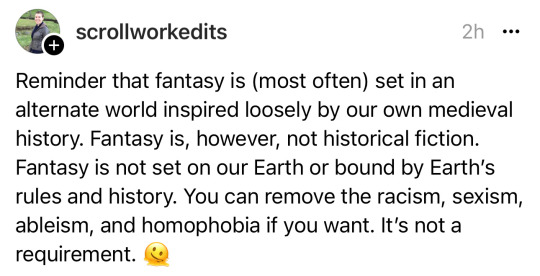
Reminder that fantasy is (most often) set in an alternate world inspired loosely by our own medieval history. Fantasy is, however, not historical fiction. Fantasy is not set on our Earth or bound by Earth’s rules and history. You can remove the racism, sexism, ableism, and homophobia if you want. It’s not a requirement. 🫠 (x)
#fiction#fiction writing#writeblr#writing tips#writing advice#fantasy writing#kcawf original#image description in alt text
662 notes
·
View notes
Text
Let's talk about worldbuilding.
Worldbuilding is a crucial aspect of writing fiction, particularly in genres like fantasy and science fiction.
Remember that worldbuilding is a dynamic process that evolves as you write. Don't be afraid to experiment and make changes to your world as needed to serve the story.
Here are some tips to help you build a rich and immersive world:
Start with a Core Concept: Every world begins with an idea. Whether it's a magic system, a futuristic society, or an alternate history, have a clear concept that serves as the foundation for your world.
Define the Rules: Establish the rules that govern your world, including its physical laws, magic systems, societal norms, and cultural practices. Consistency is key to creating a believable world.
Create a Detailed Map: Optional, but helpful. Develop a map of your world to visualise its geography, including continents, countries, cities, and landmarks. Consider factors like climate, terrain, and natural resources to make your world feel authentic.
Build a History: Develop a rich history for your world, including key events, conflicts, and historical figures. Consider how past events have shaped the present and influenced the cultures and societies within your world.
Develop Cultures and Societies: Create diverse cultures and societies within your world, each with its own beliefs, traditions, languages, and social structures. Explore how different cultures interact and conflict with one another.
Flesh Out Characters: Populate your world with memorable characters who reflect its diversity and complexity. Consider how their backgrounds, motivations, and personalities are shaped by the world around them. (See my post on character development for more!)
Consider Technology and Magic: Determine the level of technology and the presence of magic in your world, and how they impact daily life, society, and the overall narrative.
Think about Economics and Politics: Consider the economic systems, political structures, and power dynamics within your world. Explore issues like inequality, governance, and social justice to add depth to your worldbuilding.
Show, Don't Tell: Instead of dumping information on readers, reveal details about your world gradually through storytelling. Show how characters interact with their environment and incorporate worldbuilding seamlessly into the narrative.
Stay Consistent: Maintain consistency in your worldbuilding to ensure coherence and believability. Keep track of details like character names, historical events, and geographic locations to avoid contradictions.
Leave Room for Exploration: While it's essential to have a solid foundation for your world, leave room for discovery and exploration as you write. Allow your world to evolve organically and be open to new ideas and possibilities.
Revise and Edit: Carefully review your worldbuilding to identify any inconsistencies, plot holes, or contradictory elements. Pay attention to details such as character backgrounds, historical events, and the rules of your world's magic or technology. Make necessary revisions to resolve any issues and maintain the integrity of your worldbuilding.
Happy writing!
#writeblr#writing#writing tips#writing help#writing resources#writing advice#worldbuilding#fantasy worldbuilding#creative writing
635 notes
·
View notes
Text
Is this important? No!
Am I gonna keep making stuff like this? Probably!
4K notes
·
View notes
Text
ingrid sundberg's colour dictionary - writing help
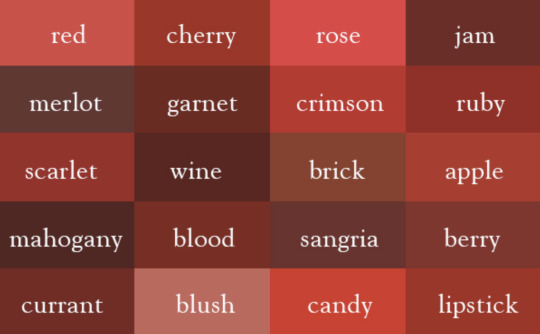
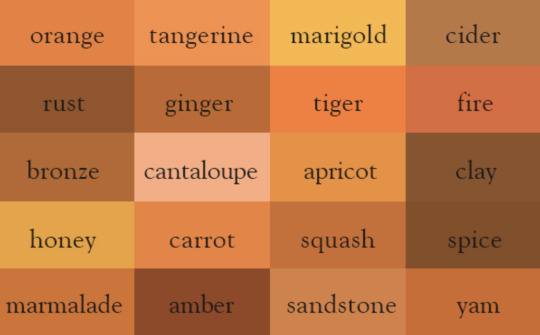
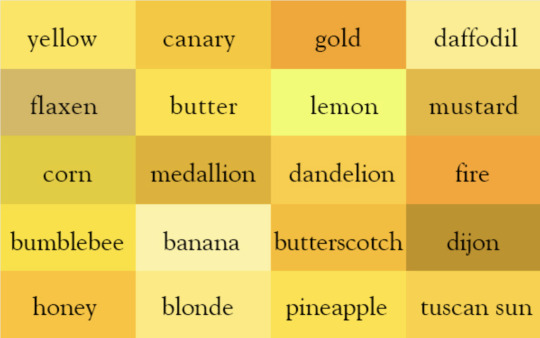
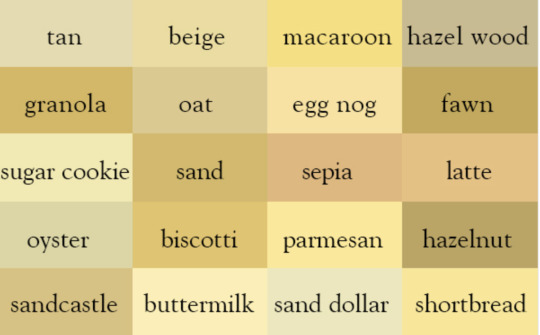
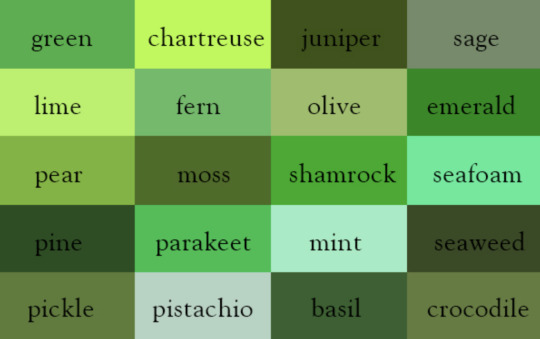
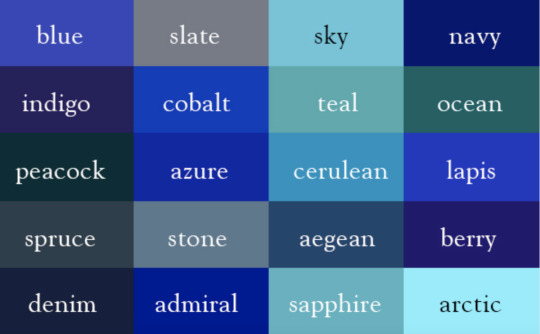
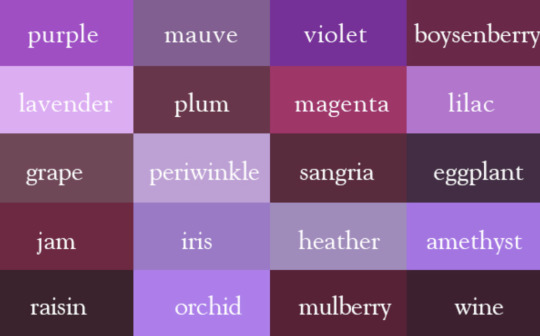
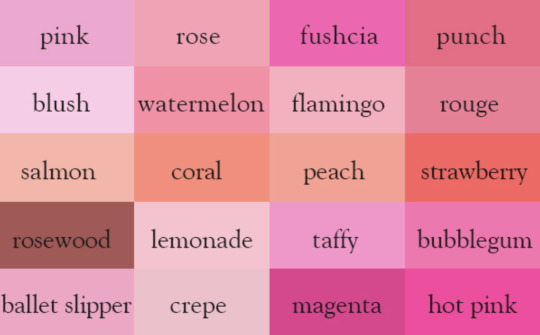
#writing tips#ingrid sundberg#colours#colour dictionary#writblr#writers#writing ideas#writers block#writerblr#creative writing#writing#authors#writing prompt#writing prompts#writing inspiration#prompts#story ideas#writing exercise#authors of tumblr#fantasy writing#novel writing#books#lyralit
19K notes
·
View notes
Text
Sorry to tell you this baby. but if your little fantasy story uses the word July, you done gone and canonized the Roman empire. Sorry bout it, but that's just how it shakes out sometimes, big boy.
#roman empire#fantasy#writing#writing tips#I'm so sorry my drunken first edition of this was historically inaccurate. may god strike me down for my idiocy.
2K notes
·
View notes
Text
Quick Tips on Writing Better Characters
Here are a handful of quick tips to writing stronger characters and understanding them better as a writer.
Give your characters a title. This can help with worldbuilding and placing your protagonist into the environment. What do others call your characters? The emperor, the bastard son, the Grinch, the chosen one, the class clown, the evil witch, the popular girl, etc.
Use your settings to enhance your character. You can use the locations of your novel to mirror or contrast your character. Do they blend in or stand out? What they focus on can say a lot about them (ex. a fearsome character mishearing things on a dark street, a princess in a ballroom only focused on the exit.)
Know your protagonist's motives and goals before you start writing. What is something they need that fuels their actions throughout the novel? Money, freedom, an artifact, food? To protect their sister at all costs and survive the Hunger Games?
Now that you know their motive, make it more complex. A character's motive can be made more complex by putting them in high-stake situations that force them to make decisions. For example, Katniss wants to protect her sister, a very common motivation. However, present-day conflict makes her to do it in the most extreme way by volunteering in the Hunger Games. The plot forces her to make an extreme choice fueled by her motivation.
Your protagonist should be active. It's okay to have your story's events sometimes happen to your character (this is referred to as the character being passive, ex. a tornado sweeping them away) but your protagonist should be active a majority of the time. This means they should always be making decisions, thinking, reflecting and progressing through obstacles.
Instagram: coffeebeanwriting
#writing tips and tricks#writing tips#writing advice#creative writing#writeblr#writing blog#how to write#writing help#writing fiction#writing prompts#fantasy writing#authortips#authoradvice#writingtips#writingmemes#writers blog#writingblog#authorsblog#howtowrite#writingtipsandtricks#writerscommunity#writers community#writinghelp#writingprompts#writertips#howtowriteascene#writingfiction#fictionwriting#fantasywriting#writing memes
2K notes
·
View notes
Text
Advice for Creating a Magic System
As a fantasy author, I thought I'd share my 5 tips for creating a captivating magic system.
1. Are you writing low fantasy or high fantasy?
Firstly, it's good to know from the get-go whether you're creating a magic system for a low fantasy or high fantasy story.
Low fantasy doesn't necessarily mean there are less fantastical elements or that the story has to take place in a version of the real world. Low fantasy simply indicates that the fantasy elements/magic is not commonplace in that world. Magic and other fantasy elements exist, but only a privy few know about it.
Examples of low fantasy stories include Harry Potter by She Who Shall Not be Named, the Mortal Instruments by Cassandra Clare, Ninth House by Leigh Bardugo, Twilight by Stephenie Meyer and my book To Wear A Crown.
High fantasy, on the other hand, indicates that the fantastical elements and magic are known about and commonplace in that world. The people of the world know that magic exists, that there are fantastical beings, other races etc.
Examples of high fantasy stories include Eragon by Christopher Paolini, Crescent City by Sarah J Maas, The Lord of the Rings by J.R.R Tolkien, and Red Queen by Victoria Aveyard.
2. Hard magic systems vs soft magic systems
The next thing that's vital to decide is whether you're creating a hard or soft magic system.
A hard magic system has built-in limitations. There are certain things that magic can do and that's it. Examples of stories with hard magic systems include Avatar: The Last Airbender and Shadow and Bone by Leigh Bardugo.
A soft magic system doesn't have inherent limitations in relation to what it can achieve. Examples of soft magic systems include Eragon, Harry Potter and The Lord of the Rings.
3. What can magic do?
Now that you know whether you're writing low or high fantasy, and whether you're working with a hard or soft magic system, it's time to create some magic!
This is the part where I can't give you too much guidance, because it's all about your creativity.
What do you want magic to look like in your story? What do you want magic to be able to achieve? How big of a role do you want magic to play in the story and your characters' lives?
Do you want different classes of magic wielders, each with mastery over their own element? Do you want magic to be a flexible tool that can be used to achieve almost anything? Do you want your magic to be limited to telepathic actions or creating portals? Do you want different people to have power over different aspects of nature or different magical disciplines?
Can wielders use magic without any tools, or do they need spells, runes or rituals?
The possibilities are endless, but it's important to establish exactly what magic is capable of in your world.
4. How does it work and where does it come from?
Now we know what the magic can do. Next up is why it can do those things. Where does the power of the magic come from and how do wielders command it?
Does the power/force of magic come from within the wielder? Does it draw from inner life force and energy? Does it draw on energy from another realm or dimension? Does it pull from the surrounding natural elements? Does the power come from a deity or from demonic forces?
Identify the source/origin of the magic.
From there, elaborate on how it works. How does a wielder access the source of the magic? Is it through strength of will, incantations, selling their soul etc.?
For example, let's say that the power of your world's magic comes from the cosmic energy of another dimension. In order for wielders to access that energy, they draw specific sigils on their skin and these sigils act as portals to that world. Once the sigil is complete, the cosmic power flows into the wielder and they can now command it.
5. The limitations
Very importantly, you have to be clear on the limitations of your magic system. Fantasy magic systems often fall flat because they don't have clear confines.
If you're writing a hard magic system, this step is a bit easier, since there are inherent restrictions on what magic can do. With soft magic systems, you have to decide just how much magic is capable of.
But whether you're writing a hard or soft magic system, you need to consider the cost of using magic.
Does the use of magic drain the wielder's energy? Does each instance of using magic darken the wielder's soul or deteriorate their body further? Does using magic damage the natural world around the wielder or drain others of their life force?
Magic without a cost, limitations or consequences just isn't as captivating.
Reblog if you liked these tips. Comment with your own advice. Follow me for similar content.
#write#writing#writeblr#writing advice#writer#writing tips#writing fantasy#writers on tumblr#fantasci tumblr
3K notes
·
View notes
Text
Random Plot Points
A little about me as a writer, I love daydreaming about adventure stories. I usually know the general set up and larger plot points but oftentimes struggle with the how, how do characters get from point A to point B.
So, I made a list of random challenges for my characters that I look at when I'm stuck.
Sharing in case helpful to others! (intended for adventure, sci-fi, fantasy stories)
characters are delayed/blocked/experience a natural disaster (storm, fire, flood, avalanche, earthquake, epidemic, etc) (BONUS and forced to take a detour from the original path)
character(s) is trapped (quick sand, fall through ice, in room filling with poison, on sinking ship, in a trash compactor on the Death Star, etc) (BONUS- fall into hidden room and discover something)
characters go to a festival/ball/party/political summit (where inevitably it all goes wrong)
character(s) overhears a secret (at bar, at party, from a whispered conversation below them in a stairway, etc)
characters are attacked by an animal or mysterious force
characters(s) caught in a mob/riot
character wins/loses something in a bet
character is brainwashed or possessed
character is stranded/lost
character is poisoned
character succumbs to injury or illness
characters are chased/ attacked by antagonists
character is captured or arrested (and needs to be rescued)
character is kidnapped and kidnappers make a demand for their release (financial ransom, exchange of information, prisoner exchange, etc)
character(s) go undercover to retrieve information
characters decide to steal something they need for their quest (weapon, magical object, money, information, etc). (BONUS- time for a well-planned heist!)
characters need to protect/ retrieve/ destroy something
characters uncover a network of spies (up to you if they're unexpected allies or antagonists)
characters discover hidden passageway, room, ruins etc that leads to an important clue
characters forced to hide from someone/something
characters need to escape
characters lured into trap set by villain (BONUS if the villain doesn't even care who wins but only goaded them to learn how a magical object works, the extent of heroes powers, emergency response system of a government, etc)
characters set trap for villain (BONUS- use someone or something important as bait) (if in Act 2, they fail)
characters reveal critical information to villain in disguise
a character is mistaken for someone else (and then is wrongfully arrested, receives information not intended for them, etc)
characters receive help (hitch a ride, get help hiding from captors, get help escaping somewhere, etc) from an unlikely new ally
characters forced to team up with an unlikely ally/ morally grey character, etc
characters learn something from simple library research (an oldie but a goodie)
characters just literally just stumble upon or witness something important (secret weapon, secret society etc)
characters uncover a secret map/ coded message on the back of an old unassuming document (time for a classic treasure hunt!)
someone escapes from prison (an old villain or an old ally) that changes the quest
someone is being blackmailed (or otherwise forced to act against the protagonists)
someone is discredited (rumor, disinformation campaign etc)
something stolen from your characters
something (document, magical object, money) turns out to be fake
OR, something unassuming turns out to have special powers or meaning
something is hacked (defense system, infrastructure, bank, private records, etc)
something critical is attacked (important bridge, port, bank/ financial system, safehouse, capitol building, character's familial home, etc.)
a computer virus is unleashed
a biological weapon is unleashed
a piece of information the characters believed was true, is false
an ancient myth turns out to be true
a secret is made public
A law is changed or a vote on a critical piece of legislation loses/wins
a political opponent wins an election/ a political ally loses an election
character(s) help a passerby (from raiders, local tyrant, beast, mystical force, etc)
characters "follow the money" and realize someone who was thought to be their ally is actually working for... (crime syndicate, villain, local tyrant etc)
#writeblr#writing tips#outlining#writing resources#writing prompts#writing#prompt list#fantasy writing
2K notes
·
View notes
Text
me when i have to research to write fiction instead of just magically injecting knowledge into my brain:

#i write historical fantasy & i want to scream#writing#writeblr#writer#writer things#writerblr#writing tips#writerslife#writing advice#creative writing#writers and poets#writers on tumblr#writblr#writers
3K notes
·
View notes